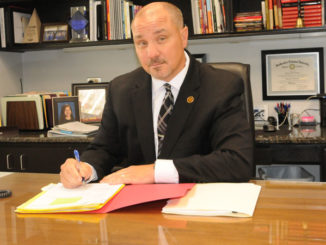
By Mike Peters
I received most of this in an email, and I added a few and thought it would be fun to share. Lovers of the English language might enjoy this.
It is yet another example of why people learning English have trouble with the language. Learning the nuances of English makes it a difficult language. (But then, that’s probably true of many languages.)
There is a two-letter word in English that perhaps has more meanings than any other two-letter word, and that word is ‘UP.’ It is listed in the dictionary as being used as an [adv], [prep], [adj], [n] or [v].
It’s easy to understand UP, meaning toward the sky or at the top of the list, but when the alarm clock goes off in the morning, we say that we wake UP? Then we get UP out of bed, right?
And why does a subject come UP for discussion? And during that discussion, someone speaks UP and expects others to listen UP.
Why are the officers UP for election and why is it UP to the secretary to write UP a report? We call UP our friends and we try to brighten UP their day. We polish UP the silver, we warm UP the leftovers and we clean UP the kitchen. We lock UP the house and some guys fix UP the old car. When we try to parallel park the car, we have to back UP and then pull UP and then back UP again. At other times, the little word has a real special meaning. People stir UP trouble, line UP for tickets, work UP an appetite, and think UP excuses for screwing UP. Robbers hold UP a bank.
To be dressed is one thing but to be dressed UP is special. Of course, it’s left UP to you where you go after you get dressed UP. And this UP is confusing: A drain must be opened UP because it is stopped UP. We open UP a store in the morning, but we close it UP at night. We seem to be pretty mixed UP about UP! We get pumped UP when the Saints and LSU win. We blow UP balloons but dynamite blows UP. When it threatens to rain, we say it is clouding UP. When the sun comes out we say it is clearing UP. When it rains, it wets UP the earth, but when it does not rain for awhile, things dry UP.
To be knowledgeable about the proper uses of UP, you should look UP the word UP in the dictionary. In a desk-sized dictionary, it takes UP almost 1/4 of the page and can add UP to about thirty definitions. If you are UP to it, you might try building UP a list of the many ways UP is used. It will take UP a lot of your time, and if you don’t give UP, you may end UP with a hundred or more.
One could go on & on, but I’ll wrap it UP for now because my time is UP!
Oh . . . one more thing: What is the first thing you do in the morning & the last thing you do at night? U P
OK – Now I’ll shut UP!




Be the first to comment